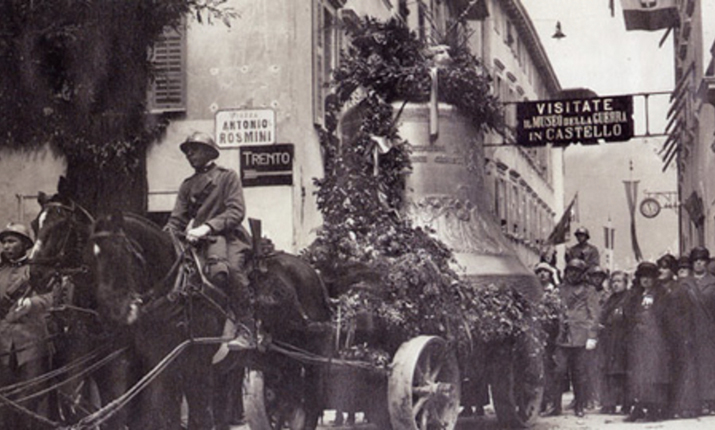FOR WHOM THE BELL TOLLS - P11
When the ‘second’ Bell of the Fallen, the one that had just been recast, arrived in Rovereto on 26 May 1940, it was not met by a crowd. And even at its departure from Verona the day before, the crowds in the streets that had always accompanied the symbol of Peace and the memory of those who had fought were not present. But not only that. Despite the solemnity of the moment, the people arriving at Piazza Rosmini to attend the ceremony were shaken by a strong sense of unease. The armies were already marching into Europe and so some of them were probably thinking that their family members would soon risk being among the fallen.
At that moment, Don Rossaro, who had not only conceived that symbol but had also fought to have it made, was caught in a vice: on the one hand there was the physical presence of the Bell with all its meanings of Peace and brotherhood, and on the other the impending tragedy clearly foretold. The ‘irrevocable decisions’ were about to be announced from the balcony of Piazza Venezia and the fascist tribunes in the city did not miss the opportunity to exploit the event. In his speech, Amilcare Rossi, who had won a gold medal for military valour, assigned the Bell the task of calling the entire Italian people to arms ‘to enrich the victorious King’s imperial crown with shining new gems’. The speeches by the prefect Italo Foschi and the podestà were of comparable rhetorical insignificance. The message sent by Pius XII calling for Peace, was not read out.
In his Diary, Don Rossaro reminded himself that most of the phrases spoken on that occasion were inconsistent with the meaning of the Bell, the solemnity of the moment, and the purposes for which it had been designed, cast and then recast a second time. But things were about to go downhill, the ‘enlightened minds’ thought they could reap huge benefits from a small, perhaps short-lived, almost painless war effort. There was no shortage of applauding crowds, and rhetoricians abounded. This was not how it went, as we know, but although he did not know it, the priest from Rovereto sensed that there was something wrong with the way his creation was being used.
He did not stop, but the cooperation of the authorities was not as full as it had once been. After the consecration, the Bell remained in Piazza Rosmini for about two weeks. On 10 June it was loaded onto a trailer to be transported to the castle. Precisely during that operation, loudspeakers were switched on ready to broadcast ‘incisive, masculine, historical’ words: the announcement of Italy’s entry into the war alongside Hitler’s Germany. Eleven days later, two trucks dragged the trailer carrying the Bell to the base of the Malipiero bastion, where it was to be hoisted. The operation lasted until 13 August and was not fully successful. In a temporary location, the symbol of Peace remained silent until the end of the war. ‘In its silence,’ Don Rossaro noted, ‘it witnessed the terrible massacre taking place on the broad front of the Great War, which, like an immense crater, swallowed up monuments, libraries, museums, palaces, and cathedrals, as well as countless human lives. In short, it threatened the collapse of our civilisation’.







